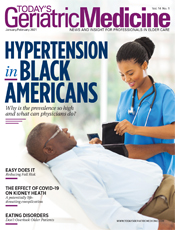
January/February 2021
Frailty: Make Frailty Part of Discussions About Surgery To help prevent poor outcomes, review the patient’s frailty risk. It’s been said that having surgery is like running a 5K, and that major surgery is like running a marathon. Not surprisingly then, even a minor surgical procedure can take a toll on a frail patient. And frailty can negatively influence outcomes of any type of operation. There are several methods for categorizing frailty. “The one used most in research is the Frail Phenotype [Fried], which has five characteristics—slow gait speed, decreased activity, unintentional weight loss, weakness, and self-reported exhaustion,” Rosenthal says. “The other most common model is the accumulation of deficits model based on comorbidities. And there are also many simple tools that can be used to measure frailty, such as the Edmonton Frail Scale or the FRAIL Scale, that are easy to use in the office setting.” According to Claire Isbell, MD, MSCI, FACS, a general surgeon at Baylor Scott & White Medical Center in Temple, Texas, and a lead investigator on a frailty study published in the Journal of the American College of Surgeons, frailty is an important risk factor that influences surgical outcomes in the geriatric population—and some younger patients as well, according to her study findings. Having Conversations About Frailty “I think the earlier upstream we’re talking about frailty, the better,” Hall says. “It’s important that PCPs are setting the right expectations in the patients’ minds from the onset. For instance, while it’s true the patient might have hernia, a condition for which surgery would typically be indicated, if the patient is higher risk for surgery because of frailty, it’s valuable that the PCP gives pause and doesn’t set the wrong expectation for what’s going to happen next.” Rosenthal agrees. “It’s not prudent to just label a patient as ‘frail’ and then deny surgery because of it,” she says. “It’s important to evaluate each older adult for the components of frailty that might be modifiable, such as undernutrition or impaired mobility, and then try to address them. That way, a frail older adult potentially in need of surgery can be prepared and the risks may be lessened.” Clifford Ko, MD, MS, MSHS, FACS, director of the division of research and optimal patient care for the American College of Surgeons, says having “goals of care” discussions is important. Some patients may care more about their quality of life than about their quantity of years, and that can influence surgical decisions. Weighing the Long-Term Benefits In some cases, Ko says, surgery can be put off in order to help get the patient more “fit” for surgery. Using his example about colon cancer—which is traditionally slow-growing—it might be more beneficial to delay surgery and spend a month doing “prehabilitation,” a new term for a proactive approach to rehabilitation that prepares patients before surgery. Ko circles back to the race analogy. “You wouldn’t just go run a 5K or a marathon without any training,” he says. “Having the patients take in purposeful nutrition and have them on their feet and walking around more ahead of surgery are things that can be done to attempt to improve their level of frailty.” An increasing amount of evidence suggests that some patients may be able to “train” for surgery, Hall says, adding that preliminary research has indicated that in as little as three to four weeks patients can increase pulmonary function or present with better peak airway pressures by adopting some of these “prehabilitation” measures. That being said, not every patient can overcome frailty, he says. Even with enhanced nutrition and activity, some patients have advanced syndrome of frailty in which they are in a persistent catabolic state. The bottom line is that some patients simply may be too frail for surgery with or without an attempt at prehabilitation. Aligning Expectations, Goals, and Realistic Outcomes “If you simply say, ‘We have a surgery that might fix that, but I think it is a bad idea because of your increased frailty-associated risk,’ we don’t serve our patients well because it forces a false choice between the promise of a ‘fix’ and ‘nothing.’ Americans do not like doing nothing. Rather, we need to become more fluent at phrasing the choice between two competing management strategies—like ‘surgery vs supportive care’ or ‘surgery vs watchful waiting,’” he says. As doctors describe these two options, Hall says, they need to use storytelling to describe what life would look like under each treatment option—what would it look like in the best, worst, and most likely scenarios. “Each option will have different trade-offs,” he explains. “Some patients may consider only the best case for surgery at first. But when they learn of what the worst case might look like, they may prefer the not-quite-as-good best case of supportive care that does not risk the worst case of disability and death associated with surgery. Different patients will value the options differently, but if we don’t expose for them what is at stake in the decision, their decision for or against either option is uninformed.” But in all cases, patients will be better prepared when they are fully informed. This, Ko says, will ultimately lead to better outcomes. “The better we can prepare a patient not only for surgery but for recovery—both in the hospital and after they’re discharged—the better chance we have at a positive outcome,” he concludes. “It all comes down to preparing them for the entire journey, not just getting through the operation itself. When we start to focus on that end game, the better off our patients and our system will be.” — Lindsey Getz is an award-winning freelance writer in Royersford, Pennsylvania. |
